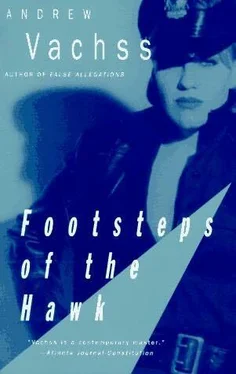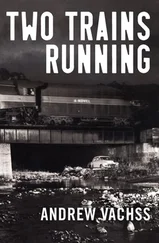"Stay low, bro— low and slow. Walk light, keep out of sight," he'd told me. I did just that, switching names, switching games. I'd used up the Anderson name years ago— too many people wanted to know how to find him. Rodriguez was the next step.
There'd be others. I know how to do it now.
Morales could find all that out if he did the work, but it wouldn't bring him any closer.
No way he had me on 24–7. He'd told the truth about working solo. He didn't have a partner anymore— the psych report would have chilled that for sure. And even if he was on the rubber–gun squad, he'd have plenty of free time. And his own collection of unregistered pieces too.
I'd met Hauser near his office. Took the subway there. And I didn't come back with him. Unless Morales had a partner— hell, lots of partners— he couldn't have done it. When you take a subway and have a car waiting at the last stop, the trail goes cold.
So he knew about Frankie. That was the only way. He could have stumbled across it, just following me, but I didn't think so. It had to be something else. We didn't have a written contract with Frankie— it was a handshake deal. I couldn't work it through, how Morales would have figured it out. But he had to know— so that's the way I'd play it.
It was a little past noon when I walked over to Mama's. I didn't much care if Morales picked up my trail from there. In fact, part of me wished he would…something about that "alibi" crack he'd made earlier. For once in my criminal life, I'd be happy for some surveillance
On that Saturday afternoon in late September, I was as legit as I'd ever been. All paid up— clean, sober, and square. Dead even. Unless you looked back into my life— then I was dead wrong.
Before all this started, I thought I knew Morales. Not the way you know a man, the way you know an animal, know their limits. Dogs could be vicious or they could be sweet…but they could never fly. That's the way I knew Morales. He was an over–the–top, head–breaking, bend–the–rules, shake–and–flake, never–take, blue–badged dinosaur street–beast. He might shoot drug dealers in the back, but he wouldn't take money from them. "He's so honest he squeaks," McGowan told me once. "Those IAD quislings don't even give you a look, you're partnered with a guy like that— they know he'd arrest you his own strange self."
Could I see Morales as a killer? Sure. In spades. He was high–tension taut, so tight he was brittle. It wouldn't take that much to snap him out, send him off.
It wasn't just the psych report. When he'd braced me in the past, it was always a game. Macho–posturing, make–my–day crap. He was hostile, but always on the safe side of rage. In that parking lot in Midtown, he was stressed way past full boil. Before, he'd been calm. Not centered, the way Max is, but still within himself.
Nobody could switch like that. Unless…I threw it out as fast as it came up. Morales was no multiple personality— near as I could tell, he didn't even have one .
The white–dragon tapestry was flying in Mama's window. I went in the front door, just in case Morales was watching. Mama wasn't at her register— her post was covered by Immaculata, dressed in one of those Mondrian silk dresses she wears every once in a while.
"What's up, Mac?" I asked her.
"Mama is in the back," she said. "With Flower. Teaching her. I can do my work anywhere," she said, flicking a long–nailed hand at a stack of paper, probably case–summary reports on some of her clients. "So I told her I wouldn't mind taking the front."
"How's business?" I asked her.
"Booming," she replied. "Unfortunately. Hard times only increase stress— a lot of marginal families lose it when the money gets too hard to find."
Immaculata works with abused children and, sometimes, their families. "Mama's business, I meant," I told her, not wanting to get into Immaculata's stuff.
"Who knows Mama's business?" She smiled.
I walked into the back, looking for Mama. Nothing. I asked a couple of her so–called cooks— they gave me blank looks in exchange. I started for the basement. One of the cooks held up a "Stop!" hand. The guy by the back door said something in Cantonese. The cook halting me stepped aside.
At the bottom of the steps, I spotted them. They were seated at a black lacquer table that was much higher on Mama's side than the child's. The table didn't slope— it had been built with a stagger in the middle, like a stair step. I walked over quietly, not wanting to disturb the clear silence. Mama's part of the table held only a black vase with a single white lily standing. She rested one elbow on the table, cupping her chin in her hand, watching Flower. The little girl's tabletop had a stone inkpot, a pad of blotters, and some sheets of heavy, textured paper. Her hand held an ivory stylus. They both looked up as I approached and I could see they were dressed alike, in matching kimonos of plum–colored silk with a black design on the left chest wrapping around to the sleeve.
"I apologize for disturbing you," I said, bowing slightly
"It is okay," Mama said, nodding her head in acknowledgment. "Almost time to rest. Have tea, yes?"
"Thank you," I said.
"Thank you ,"Flower said, giggling. "My hand hurts."
"What are you working on?" I asked the child, squatting down so my face was level with hers. I could see both Immaculata and Max in her face— and I gave silent thanks that she was clearly going to favor her mother.
"Calligraphy," Flower said gravely, pronouncing the word with all the assurance of her seven years.
"Very important," Mama said. "First others', then your own— that is the way."
"I don't get it," I told her.
"We are learning haiku," Mama told me. "Very good discipline. Very important for balance. We practice the old ways, to master them,"
"When I learn to write properly, I can write my own words," Flower said, repeating a past lesson with pride.
"Yes," Mama said. "Haiku is search for perfection. Each person has his own. All life, you work on it. Perfection is not what you ever get…"
"…it is what you reach for," Flower finished for her, a grin on her little face.
"Yes!" Mama said, returning the child's smile.
"I thought haiku was Japanese," I said to Mama.
"Copy," Mama hissed. "Copy like they copy everything else. All root knowledge is from Chinese— they only copy."
"I understand," I said quietly, switching off the subject before Mama got wound up. Stupid of me to forget Mama's prejudices. It took me years to understand that tribalism was stronger than racism could ever be, I learned it in Africa, but sometimes I forget. "What haiku are you doing?" I asked the child, looking over her shoulder at the meticulous characters she had drawn, surprised to see them in English.
"I am just practicing now," Flower said gravely. "So that the pen becomes my thoughts."
"This very old haiku," Mama said, pointing to the original from which Flower was copying. "Haiku is precise. Always five, seven, five. Syllables. In English, must be the same."
I looked over her shoulder. The words were written on rice paper that looked older than me. Written in a sharp–edged calligraphic hand. Mama's?
the ferret, hunting,
eyes on the ground, never hears
footsteps of the hawk
"You understand?" Mama asked, watching my face.
I stood there a long time, watching the haiku until it turned liquid in my vision. "Yes," I told her, bowing.
Getting what I came for.
Upstairs, we all sat at my table in the back. Mama brought tea for everyone. She knows I hate the stuff, but I sipped it anyway, not wanting Flower to learn anything bad from me. Immaculata smiled slightly, raising her eyebrows as I sipped.
"Very good lesson today," Mama said to Immaculata.
Читать дальше












